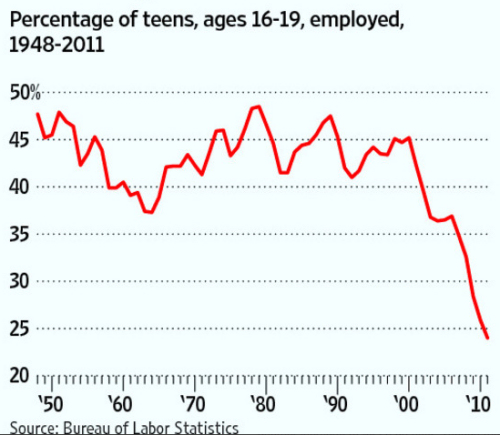Only 1 in 4 Teens is Employed
Teenage employment rates have averaged around 45% since the 1950’s but since 2000 the teenage employment rate has plummeted. Currently less than 25% of teenagers can find a job. But don’t worry the government has a plan to create 50,000 new jobs…
So what is this magic plan you might ask?
Simple the “Center for American Progress”, often called the think tank for the Obama White House, recently recommended an increase in the minimum wage to $8.25 an hour. According to this brilliant organization… this would somehow “stimulate economic growth to the tune of 50,000 new jobs.” By this logic why don’t we just raise the minimum wage to $100/hr and create full employment and make everyone rich?
Last I heard every economist in the world agrees that raising the minimum wage destroys jobs.
Assume that hiring an unskilled employee allows a company to make an additional $10 an hour. If they pay him $7.25 plus social security and other payroll expenses they might be lucky to make $1 per hour off that employee. But if a marginal company is breaking even at the current minimum wage of $7.25 and the minimum wage is is raised by 13.7% to $8.25 that company would be losing $1.00 per hour for every hour that employee works. How many hours do you think the company is going to be paying for at a negative return?
So all the marginal jobs will be lost. Employers will simply fire the marginal employees so they can afford to pay the higher salary and they will expect the remaining employees to take up the slack. If that is not possible, they will simply go under and lose even more jobs. That is simply the way it works. In order to create more jobs the only way to do it is to lower the minimum wage. The minimum wage as recently as 2007 was $5.15 and it was raised in stages to $7.25 by 2009. And during that same period employment went from 135 million jobs to 130 million jobs. Of course the economy was stalling during that same period so not all of those jobs were lost because of the raise in the minimum wage but it certainly helped to eliminate the marginal jobs.
Unfortunately, the burden of these lost jobs falls heaviest on the teenage population. They are the least experienced, the last hired and often the least reliable. Employers would generally rather keep more experienced and often more reliable employees. Given a choice, many employers will choose to keep someone with a family to support rather than a teenager who stills lives with his parents.
A recent Wall Street Journal article highlights the problem.
“the minimum wage increase has coincided with the plunge in the percentage of working teens. Before the most recent wage hikes, roughly seven million teens were working. Now there are closer to five million with a job and paycheck.”

